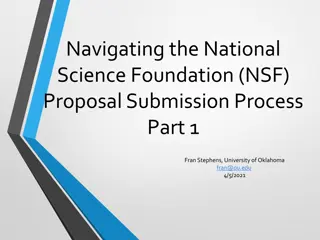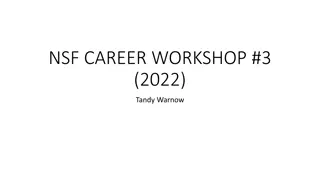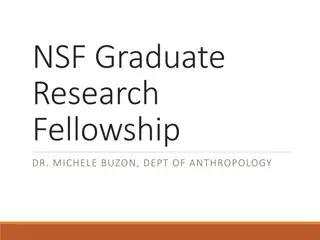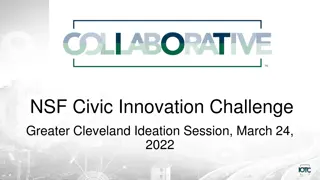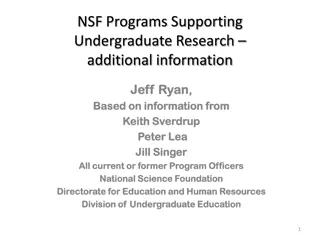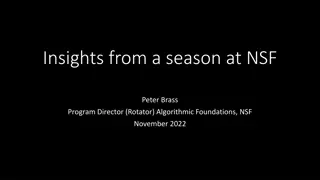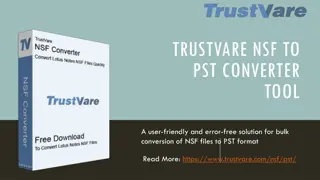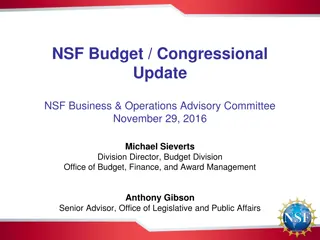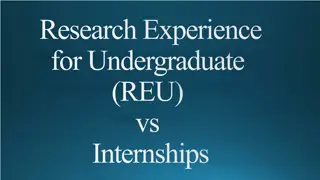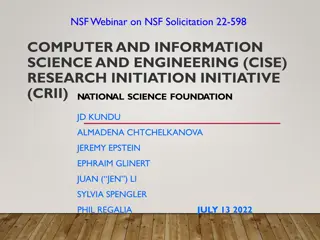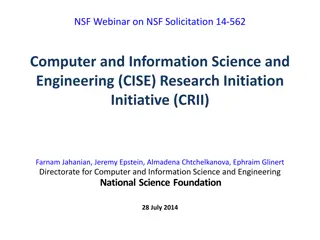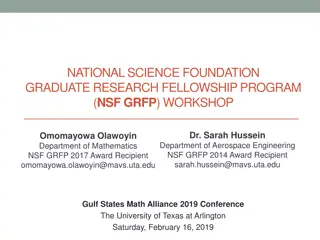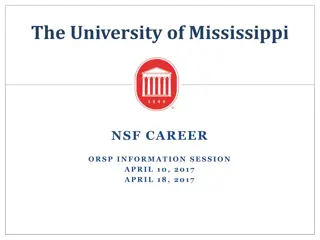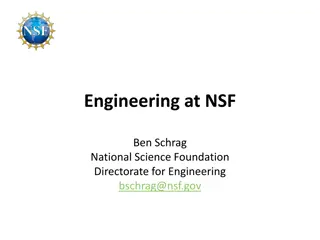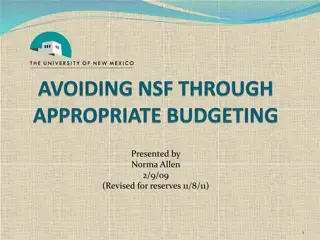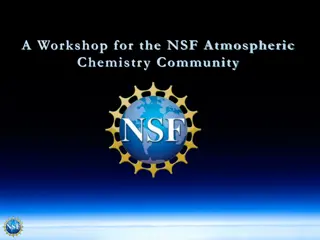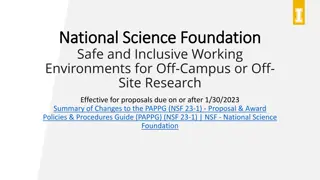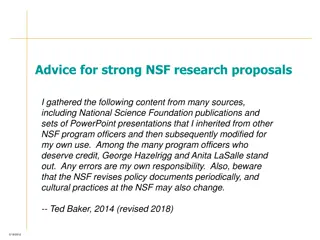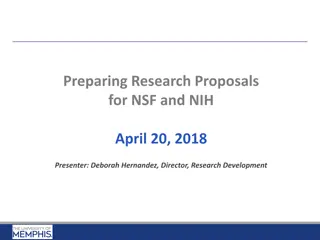NSF EPSCoR Workshop Opportunities Program Overview
Established Program to Stimulate Competitive Research (EPSCoR) aims to enhance research competitiveness in targeted jurisdictions through investments in STEM capacity. Eligible jurisdictions can participate in various EPSCoR programs and investment strategies focused on research infrastructure improvement, collaborations, and building research ecosystems.
Download Presentation

Please find below an Image/Link to download the presentation.
The content on the website is provided AS IS for your information and personal use only. It may not be sold, licensed, or shared on other websites without obtaining consent from the author. Download presentation by click this link. If you encounter any issues during the download, it is possible that the publisher has removed the file from their server.
E N D
Presentation Transcript
NSF EPSCoR February 20, 2024 Established Program to Stimulate Competitive Research: Workshop Opportunities (EPS-WO) Pinhas Ben-Tzvi Ben McCall Program Officers OD/OIA/RCC/EPSCoR 1
U.S. National Science Foundation (NSF) U.S. National Science Foundation (NSF) Org Chart Office of the Director National Science Board (NSF) Office of International Science and Engineering (OISE) Office of the General Counsel (OGC) EPSCoR Research Capacity and Competitiveness (RCC) Section Office of Legislative and Public Affairs (OLPA) Office of Integrative Activities (OIA) HBCU-EiR Office of Inspector General (OIG) Office of Equity and Civil Rights (OECR) NSF Chief Officers Directorate for Computer Information Science & Engineering (CISE) Directorate for Biological Sciences (BIO) Directorate for Engineering (ENG) Directorate for Geosciences (GEO) Directorate for Social, Behavioral and Economic Sciences (SBE) Directorate for STEM Education (EDU) Directorate for Technology, Innovation and Partnerships (TIP) Directorate for Mathematical & Physical Sciences (MPS) Office of Budget, Finance and Award Management (BFA) Office of Info & Resource Management (OIRM)
Established Program to Stimulate Competitive Research (EPSCoR) Mission: To enhance the research competitiveness of targeted jurisdictions by strengthening science, technology, engineering and mathematics (STEM) capacity and capability through a diverse portfolio of investments from talent development to local infrastructure. Eligibility: A jurisdiction is eligible to participate in the U.S. National Science Foundation's EPSCoR program if their most recent five-year level of total NSF funding is equal to or less than 0.75% of the total NSF budget (excluding EPSCoR funding and NSF funding to other federal agencies). 3
EPSCoR Investment Strategies Research Infrastructure Improvement (RII) Programs (78-84% of EPSCoR budget) RII Track-1 (sunsetting) EPSCoR Collaborations for Optimizing Research Ecosystems (E-CORE) EPSCoR Research Incubators for STEM Excellence Research (E-RISE) Focused EPSCoR Collaborations (formerly Track-2) EPSCoR Research Fellows (formerly Track-4) Support physical, human, and cyber infrastructure within academic institutions across each jurisdiction Co-Funding w/ NSF Directorates & Offices (16-22% of budget) Meritorious proposals reviewed in other NSF programs that also satisfy EPSCoR programmatic criteria Outreach and Workshops (0.5-1% of budget) Interaction among EPSCoR Community and NSF to build mutual awareness and develop areas of potential strength GU Team at SACNAS IA Strategic Plan Integration of Project 5
Workshop Opportunities (EPS-WO) Goals Supports workshops in eligible jurisdictions that focus on topics of regional or national importance, and which are relevant to building EPSCoR jurisdictions R&D capacity. EPSCoR welcomes proposals for workshops from institutions within EPSCoR-eligible jurisdictions. Workshops will focus on innovative ways to address multi- jurisdictional efforts on themes of regional to national importance with relevance to EPSCoR's goals and NSF's mission. Sinte Gleska University (SGU) and South Dakota State University. improve sustainable production of prairie turnips and buffalo berries 6
Whats New with this Solicitation Submission of a Concept Outline, followed by an invitation from an NSF EPSCoR Program Officer to submit a full proposal, is required before the submission of a full workshop proposal. Maximum budget for workshops has been increased to $200,000. Virtual workshop proposals are explicitly allowed. WY - understand whether microbial communities in seasonal snow were actively contributing to nutrient cycling Institutional eligibility has been clarified. Allowable workshop topics have been expanded to include activities for the creation of center-level partnerships. 8
EPSCoR Workshop Opportunities Program Description Workshops proposals are welcome in areas of science and engineering that advance the program s goals and engage a broad community of investigators or practitioners, while including the intentional involvement of the EPSCoR community. Workshops aim to bring communities of thought together to discuss recent research or education findings Explore topics in emerging areas of science and engineering Foster innovative collaborations Expose researchers or trainees to new research and education tools or techniques Respond to NSF EPSCoR calls for workshops on specific topics 9
Expectations of EPSCoR Workshop Proposals Proposals may address any topic, including the exploration of topic areas that have been described as NSF priorities. Applicants should demonstrate how the topic is of importance to relevant STEM field(s) and include evidence that the topic will engage and be of particular interest to the greater EPSCoR community. Topics may also include proposed activities for the creation of center-level partnerships. Topics related to center-level investments may include but are not limited to Engineering Research Centers, Science and Technology Centers, Regional Innovation Engines, and other current or future federal opportunities. Goals and desired outcomes, anticipated products, and benefits that the workshop will have for its participants should be explicitly described Successful proposals will also demonstrate that the team has worked to ensure that there is a diversity of participating individuals that includes groups reprepresented in STEM at every level from the advisory committee and leadership to the speakers and participants. A tentative agenda that includes suggested speakers, and letters of support that lend evidence of participation from key participants or collaborators Proposals should include a plan for communicating workshop outcomes and disseminating workshop products Proposals should include an evaluation plan that assesses whether the goals of the workshop have been achieved. 10
Successful workshop proposals will: Include a compelling rationale, with clear goals and desired outcomes; a committed leadership team; institutional support; and leveraged resources. Address multi-jurisdictional efforts, priorities, or interests that require collaboration for optimal success. Address major regional or national themes of relevance to EPSCoR's goals and NSF's mission. Describe the inclusion of individuals from groups underrepresented in STEM. Efforts to do so must be evident at all levels from the planning committee and speakers to the workshop participants. Include institutions of higher education that serve populations that are traditionally underrepresented in STEM (defined as minority-serving institutions, women s colleges, or institutions where the majority of students are students with disabilities). 11
Additional Guidance Workshops are not intended for single-institution activities. Speakers from non-EPSCoR institutions may be involved in the workshop, but funding for their travel expenses must be included in the Participant Support Cost budget category. No funds may be budgeted for non-EPSCoR institutions. Each funded workshop should result in a publicly-disseminated workshop report that should be posted on the relevant jurisdictions' web sites and must include: The metrics and measures of workshop programmatic success. The extent of the inclusion of individuals from groups underrepresented in STEM through evaluation and feedback. The extent of the inclusion of institutions of higher education that serve populations that are traditionally underrepresented in STEM (defined as minority-serving institutions, women s colleges, or institutions where the majority of students are students with disabilities). A plan for widespread dissemination of results. A list of workshop participants. A comprehensive discussion of the workshop's products and specific implementation plans for the next steps. 12
EPS-WO Concept Outline Preparation and Submission Instructions Submission of a Concept Outline, followed by an invitation from an NSF EPSCoR Program Officer to submit a full proposal, is required before the submission of a full workshop proposal. Concept Outlines may be submitted via email to nsfepscor@nsf.gov at any time or directly to any cognizant Program Officer listed in the solicitation. The workshop proposal development process is outlined below. Identify and develop the workshop theme. Identify the rationale and theme or topic of the workshop. Convey EPSCoR community interest in the topic, which should be substantial and gauged by appropriate means (for example use of a survey or focused conversations). Form an advisory committee to verify and develop the concept within the greater body of knowledge in the field, ensuring that it is not duplicative of other efforts, and to obtain data supporting the theme or concept. 13
EPS-WO Concept Outline Preparation and Submission Instructions Draft a Concept Outline. Detailed planning of the workshop, the interest of the EPSCoR community, and the workshop preparation timeline should be outlined in a Concept Outline, which must not exceed 5 pages. During the Concept Outline preparation process, proposers are encouraged to: Develop a compelling rationale with clear goals and desired outcomes. Determine the availability and interest of prospective speakers and participants. Address the recruitment and inclusion of groups underrepresented in STEM areas that include the leadership team, speakers, participants. Develop an estimated budget and budget justification, schedule of activities, and a proposed target date for the workshop. Discuss methods of dissemination, evaluation and assessment, and desired outcomes/deliverables. Submit a Concept Outline via email to nsfepscor@nsf.gov or directly to any cognizant Program Officer listed in the solicitation. 14
EPS-WO Full Proposal Preparation Instructions Full proposals should: Incorporate feedback obtained from NSF EPSCoR from the Concept Outline. Include all five categories of information described above for Concept Outlines. Explicitly address one or more of the EPSCoR goals listed in section I.A above. Follow the guidelines for Conference proposals contained in the NSF PAPPG, Chapter II.F.9. Select the conference proposal type in Research.gov or Grants.gov. Include the email from a Program Officer inviting the PI to submit a full proposal as a Supplementary Document entitled "Program Officer Concurrence Email." Typical Timeline: One month for NSF EPSCoR to review the Concept Outline. Six months from full proposal submission to funding decision. It is recommended to begin the Concept Outline development process at least 12 months before the envisioned workshop, when possible, to allow ample time for proposal development and review. 15
Merit Review Criteria All NSF proposals are evaluated through use of the two National Science Board approved merit review criteria. Both criteria are to be given full consideration during the review and decision-making processes; each criterion is necessary but neither, by itself, is sufficient. Therefore, proposers must fully address both criteria. When evaluating NSF proposals, reviewers will be asked to consider what the proposers want to do, why they want to do it, how they plan to do it, how they will know if they succeed, and what benefits could accrue if the project is successful. Reviewers will be asked to evaluate all proposals against two criteria: Intellectual Merit: The Intellectual Merit criterion encompasses the potential to advance knowledge; and Broader Impacts: The Broader Impacts criterion encompasses the potential to benefit society and contribute to the achievement of specific, desired societal outcomes. 16
Eligibility Information Proposals may be submitted only from institutions or organizations within EPSCoR-eligible jurisdictions. Eligibility to participate in the EPSCoR Workshop Opportunities program is described on EPSCoR s website. Within EPSCoR-eligible jurisdictions, proposals may be submitted only by the following: Institutions of higher education (PhD-granting and non-PhD-granting), acting on behalf of their faculty members, that are accredited in and have a campus in the United States, its territories, or possessions. Non-profit, non-degree-granting domestic U.S. organizations, acting on behalf of their employees, that include (but are not limited to) independent museums and science centers, observatories, research laboratories, professional societies, and similar organizations that are directly associated with the Nation's research or educational activities. These organizations must have an independent, permanent administrative organization (e.g., an office of sponsored research) located in the United States, its territories, or possessions, and have 501(c)(3) tax status. KY Plant Genetics Tribal Nations: An American Indian or Alaska Native tribe, band, nation, pueblo, village, or community that the Secretary of the Interior acknowledges as a federally recognized tribe pursuant to the Federally Recognized Indian Tribe List Act of 1994, 25 U.S.C. 5130-5131. Bridge HS to BS TCU ND
Proposal Preparation Instructions Letters of Intent: Not required Preliminary Proposal Submission: Not required Who May Serve as PI: no restrictions or limits. Limit on Number of Proposals per Organization: no restrictions or limits. Limit on Number of Proposals per PI or co-PI: no restrictions or limits. NM SmartGrid-Early faculty workshop Full Proposals: Full Proposals submitted via Research.gov: NSF Proposal and Award Policies and Procedures Guide (PAPPG) guidelines apply. 18
Thank you! Ben McCall Pinhas Ben-Tzvi Email: pbentzvi@nsf.gov Email: bjmccall@nsf.gov



